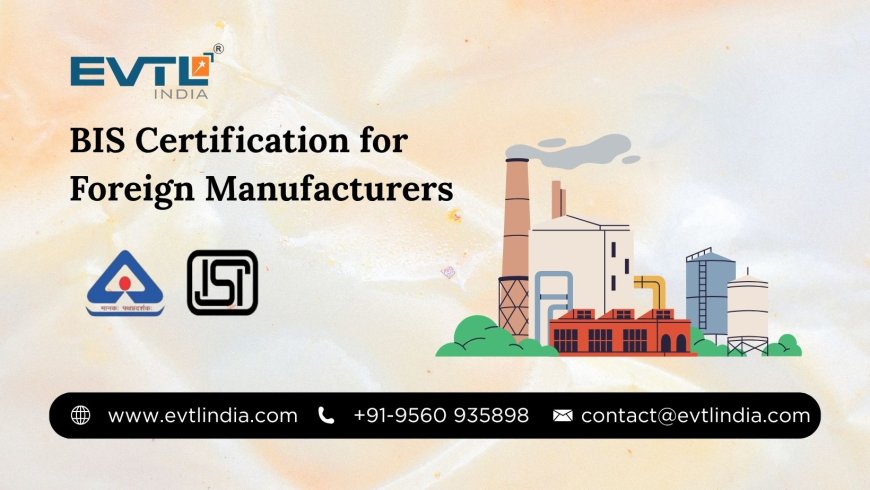Everything You Need to Know About BIS FMCS

When it comes to expanding into the Indian market, foreign manufacturers often encounter regulatory challenges. One of the most critical certifications required for certain products is the BIS FMCS the Bureau of Indian Standards' Foreign Manufacturers Certification Scheme. This certification plays a vital role in ensuring product quality and safety for Indian consumers, while also allowing foreign businesses to sell their products legally in India.
In this blog, we will break down everything you need to know about the BIS FMCS process, benefits, eligibility, steps to obtain it, and the role of a consultant in simplifying the process.
What is BIS FMCS?
BIS FMCS Certification stands for the Foreign Manufacturers Certification Scheme under the Bureau of Indian Standards (BIS), Government of India. This scheme is specifically designed for overseas manufacturers who wish to export their products to India and comply with Indian standards.
The FMCS operates under the provisions of the BIS Act, 2016 and is applicable to products falling under the mandatory certification category. These include electronics, steel, cement, household appliances, food-grade materials, and more.
Foreign manufacturers who meet the requirements are granted a license to use the Standard Mark (ISI Mark), which assures Indian customers that the product meets predefined safety and quality standards.
Why is BIS FMCS Certification Necessary?
India has a growing concern for consumer safety and quality. To ensure that products imported from outside meet the same standards as those manufactured domestically, the Government of India has made BIS certification mandatory for several products.
Heres why BIS Certification for Foreign Manufacturers is crucial:
-
Legal Compliance: Products listed under mandatory certification cannot be sold in India without a BIS license.
-
Market Access: It enables foreign manufacturers to legally enter and trade in one of the worlds largest consumer markets.
-
Consumer Trust: Indian customers are more likely to trust products that come with the ISI Mark.
-
Avoid Penalties: Non-compliance can result in fines, rejection at customs, or product recalls.
Key Features of BIS FMCS
The Foreign Manufacturers Certification Scheme differs slightly from the Domestic BIS certification in terms of documentation, timelines, and product shipment. Key highlights include:
-
Factory Inspection: A mandatory inspection of the manufacturing unit by BIS officials.
-
ISI Marking: Upon successful completion, the manufacturer receives permission to affix the ISI Mark on products.
-
Authorized Indian Representative (AIR): Foreign applicants must appoint an AIR who will liaise with BIS.
-
License Validity: Initially granted for 1 year, the license can be renewed based on performance and compliance.
-
Fees: Includes application, inspection, marking, and license fees.
Products That Require BIS FMCS Certification
The following product categories commonly require BIS FMCS Certification:
-
Electronic and IT products
-
Household appliances
-
Batteries
-
Pressure cookers
-
Steel and alloy products
-
Cement
-
Automotive accessories
-
Food-grade containers
The list is updated frequently, so its advisable to check the latest QCO (Quality Control Orders) released by the Ministry of Commerce and Industry or consult a BIS expert.
Step-by-Step Process to Get BIS FMCS Certification
Obtaining a BIS FMCS License involves a detailed process. Here is a simplified step-by-step guide:
1. Check Product Applicability
Ensure your product falls under the mandatory certification list. You can do this by checking the official BIS website or consulting a certified professional.
2. Appoint an Authorized Indian Representative (AIR)
The AIR is legally responsible for the product in India. The representative must be an Indian national or an Indian entity.
3. Submit the Application
Prepare documents like:
-
Business license of the manufacturer
-
Manufacturing process details
-
Product specifications
-
Test reports from BIS-recognized labs
-
AIR undertaking and ID proof
4. Factory Inspection
BIS officers will visit the manufacturing unit to inspect quality control procedures and product conformity to standards.
5. Sample Testing
During the inspection, samples are collected and tested in BIS-recognized laboratories.
6. Grant of License
If all requirements are met, BIS issues a license and authorizes the use of the ISI Mark on the certified products.
7. Renewal
The license must be renewed periodically based on continued compliance.
Documents Required
Here is a list of commonly required documents:
-
Filled BIS application form
-
Business registration certificate
-
AIR details with authorization letter
-
Factory layout plan
-
List of testing equipment
-
Product details and specifications
-
Quality control system information
-
Test reports from BIS-accredited labs
Role of a Top BIS FMCS Consultant
BIS FMCS Certification can be a lengthy and complex process, especially for first-time applicants. This is where the services of a Top BIS FMCS Consultant come in handy.
Heres how an expert consultant can help:
-
Determine whether your product requires BIS FMCS
-
Identify applicable Indian standards (IS)
-
Handle all application formalities and documentation
-
Coordinate factory inspections and sample testing
-
Act as liaison between your AIR and BIS
-
Track certification status and license renewal
A reliable consultant helps in minimizing delays, avoiding rejections, and reducing compliance costs.
Qualities of a Trusted BIS FMCS Agent
Choosing a good BIS FMCS Agent is essential for hassle-free certification. Look for:
-
Experience in dealing with similar product categories
-
In-depth knowledge of BIS regulations
-
End-to-end services from application to license delivery
-
Transparent pricing with no hidden charges
-
Prompt support for renewal and surveillance audits
Such agents can make the difference between a quick approval and a rejected application.
Challenges Faced by Foreign Manufacturers
Some common issues faced by foreign applicants include:
-
Language and documentation barriers
-
Unfamiliarity with Indian regulations
-
Unavailability of BIS-recognized testing labs in their region
-
Delays in appointment of AIRs
-
Inspection scheduling and travel coordination
Working with professionals can significantly reduce these challenges and smoothen the journey.
Conclusion
EVTL India is one of the leading BIS Consultant in India, helping manufacturers obtain their BIS licences hassle-free. BIS FMCS is a vital certification for foreign manufacturers aiming to capture the Indian market. While the process may seem complicated due to mandatory inspections, documentation, and regulatory compliance, the benefits far outweigh the challenges.
Certification not only helps in gaining legal entry to Indias huge consumer base but also builds brand credibility, enhances customer trust, and ensures product safety. If you're a foreign manufacturer, engaging a BIS FMCS Consultant or Agent can help you navigate the entire process quickly and efficiently.
India is growing rapidly, and now is the right time to enter this market with certified and compliant products. Ensure you meet the requirements, choose the right experts, and open the doors to success.








































